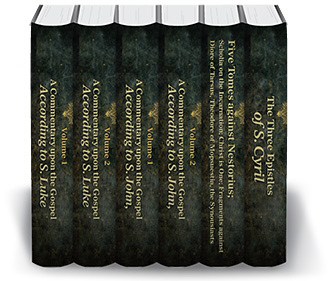Today’s post is by Louis St. Hilaire, Content Manager of our Electronic Text Development department.
If you’re interested in the preaching and exegesis of the fathers of the church, there are three important collections available for pre-order that you should know about.
The Works of St. Cyril of Alexandria makes an excellent complement to the Early Church Fathers collection. Cyril was central to the Christological controversies of the fourth and fifth centuries and was well regarded in later centuries, but is oddly neglected in the Nicene and Post-Nicene Fathers. This collection closes the historical gap with letters and writings related to Cyril’s controversy with Nestorius, but, just as importantly, it includes Cyril’s massive commentaries on Luke and John.
Very few patristic commentaries on Luke have survived, so Cyril’s commentary on Luke is an important witness to the interpretation of this Gospel in the first millennium. Aside from a few sermons of Augustine, it will be the first from this era to be available for Logos.
John was much more commonly preached and commented on, so the Early Church Fathers already has commentary or homilies on John from Origen, Augustine and John Chrysostom. Adding Cyril’s commentary to this lets you see the development of the Alexandrian tradition of interpretation from Origen to Cyril, or compare, side by side, this tradition in Cyril with those of Antioch and the Latin West represented by Chrysostom and Augustine respectively.
Theodore of Mopsuestia’s Commentary on the Minor Pauline Epistles brings to Logos for the first time the writings of the man who was, in many ways, the mind opposite Cyril’s in the Christological controversies and theological and exegetical rivalry between Alexandria and Antioch. While it’s now acknowledged that the contrast between Alexandrian allegory and Antiochene literalism is not quite as sharp as was once thought, Theodore is perhaps the most typical and famous representative of the Antiochene tradition, and his comments onGalatians 4:21-31 contain an important polemic against the allegorists.
The Medieval Preaching and Spirituality Collection also includes writings of several later writers from the patristic era, including John Damascene, Boethius, and Gregory the Great. Important among these is Gregory the Great’s Morals on the Book of Job. The interpretation of the Old Testament was a pressing problem for the early church, as it engaged in controversies with Gnosticism, Judaism, and pagan critics. Gregory stands near the end of this era, as an heir to the exegetical methods pioneered and developed by men like Irenaeus, Origen, and Augustine, and his commentary on Job formed an important bridge from his own era to later centuries. It was incredibly influential in the Middle Ages, being cited hundreds of times in the Summa Theologica of Thomas Aquinas.
If you’re interested in learning more about the biblical interpretation of the church fathers, take a look at Manlio Simonetti’s Biblical Interpretation in the Early Church or the Historical Interpreter’s Collection.





